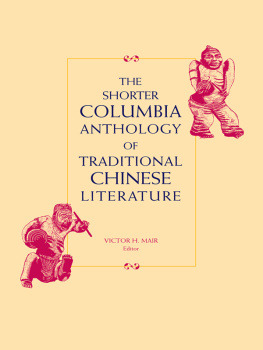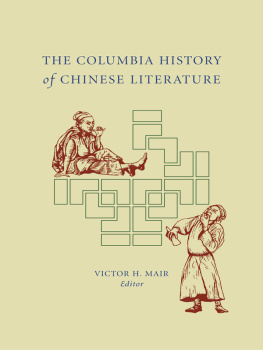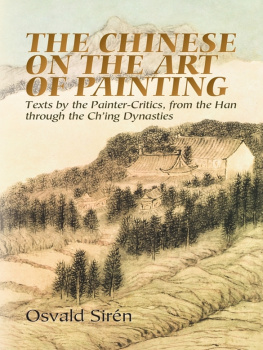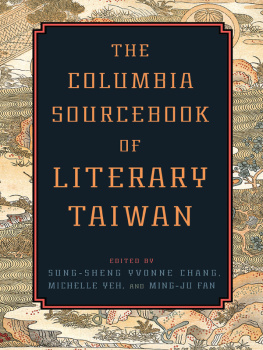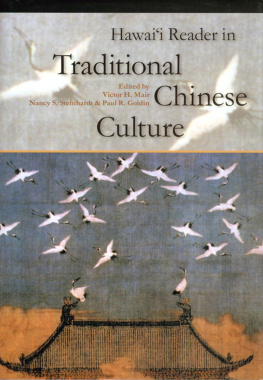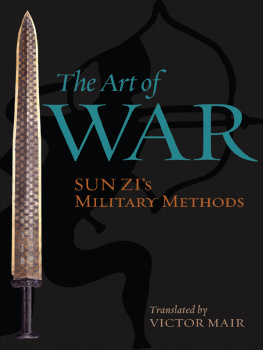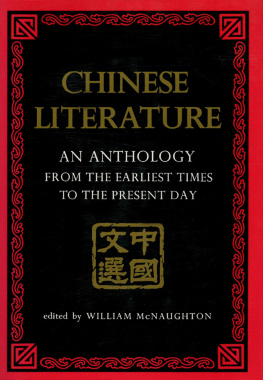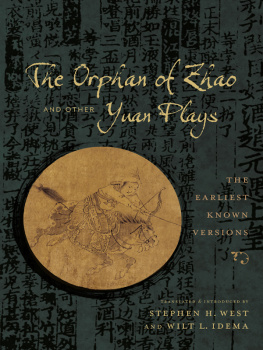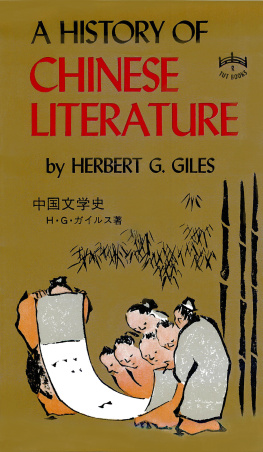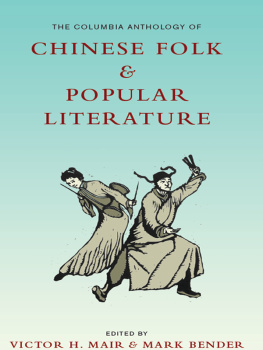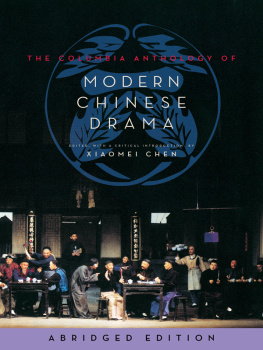THE SHORTER
COLUMBIA ANTHOLOGY
OF TRADITIONAL CHINESE
LITERATURE
TRANSLATIONS FROM THE ASIAN CLASSICS
TRANSLATIONS FROM THE ASIAN CLASSICS
EDITORIAL BOARD
Wm. Theodore de Bary, Chairman
Paul Anderer
Irene Bloom
Donald Keene
George A. Saliba
Haruo Shirane
David D. W. Wang
Burton Watson
THE SHORTER
Columbia Anthology
of Traditional Chinese
Literature
Victor H. Mair, editor

COLUMBIA UNIVERSITY PRESS / NEW YORK
Columbia University Press
New York Chichester, West Sussex
cup.columbia.edu
Copyright 2000 Columbia University Press
All rights reserved
E-ISBN 978-0-231-50562-8
Library of Congress Cataloging-in-Publication Data
The shorter Columbia anthology of traditional Chinese literature / Victor H. Mair, editor.
p. cm.(Translations from the Asian classics)
Includes bibliographical references.
ISBN 978-0-231-11998-6 (alk. paper)ISBN 978-0-231-11999-3 (pbk. : alk. paper)
1. Chinese literatureTranslations into English. I. Title: Columbia anthology of traditional Chinese literature. II. Mair, Victor H., 1943 III. Series.
PL2658.E1 S53 2000
895.108dc21
00-035878
A Columbia University Press E-book.
CUP would be pleased to hear about your reading experience with this e-book at .
For Tom and Taunja
CONTENTS
This Shorter Columbia Anthology of Traditional Chinese Literature is based on The Columbia Anthology of Traditional Chinese Literature, which first appeared in 1994. After the original anthology was published, the need for a streamlined edition was repeatedly expressed to the editor and to the press. In particular, many teachers at community colleges and liberal arts colleges found the original anthology too lengthy for the type of courses they offered. They liked the commentaries and the contents but regretted that there was too much of both for their students to digest. In response to their requests, we are offering this revised and abridged version.
In this new work, the basic conceptual structure of the original is retained. The arrangement of the texts and commentaries remains the same. The major difference is that the size of the book has been reduced by almost half. The scope of the Shorter Anthology is still quite generous, however, with 218 selections (compared to 278 in the original, unabridged anthology). This reduction of size but retention of overall scope and maintenance of general nature has been achieved in the following ways: some of the longer fiction has been removed; where the original anthology gave four or five parallel examples of a given genre, the number has now been reduced to two or three; the amount of poetry representing each poet has been cut by one- to two-thirds; and several of the more esoteric texts and obscure authors have been eliminated. In the spirit of the original, I have striven to use only integral texts. Nothing is more annoying to a reader of translated literature than encountering ellipses at every turn, causing him or her to wonder what was left out and why.
Although every effort has been made to pare down the liberal dimensions of the original anthology to a more manageable and portable size, all the special favorites have been kept, such as the jokes, medieval doodles, the aphorisms of Li Shang-yin, the raucous tale of the sharp-tongued shrew, and the poem consisting of puns on the names of medicines. The sole addition has been the inclusion of the complete play Injustice to Tou, of which formerly only one act was included. This most beloved and revealing of Yan dramas thus takes the place of a rare comedy with a slight anti-Buddhist tinge.
The primary purpose of this anthology is to provide a broad selection of expertly translated texts from the widest possible variety of sources while staying within the limits of a portable text. My aim throughout has been to give a sense of the full range of Chinese literature. The editorial principles I have employed do not restrict literature to belles lettres in the narrowest sense. For the purposes of this anthology, literature is construed very broadly as writing that is vivid or imaginative. Literature may be driven by a lyrical impulse or generated by a narrative intent; it may even be chiefly descriptive or expository. A text might be concerned with any sort of subject matter or be written in virtually any genre or form; so long as it has esthetic merit or genuine emotional appeal (apart from whatever its original purpose may have been), it can be considered literature. This anthology attempts to show that many different types of written texts might be thought of as literature.
The rather narrow limits that have heretofore been used with regard to Chinese literature necessitate an enlargement of the canon. To a certain extent, then, this is meant to be an iconoclastic anthology. As soon as we free ourselves from the customary constraints imposed by the concept of what is classical, we discover that an enormous number of interesting texts are available for consideration. Throughout history, the tradition was constantly reshaped in response to a host of literary and nonliterary factors. And, in retrospective fashion, it will go on being remade in response to similar factors. Chinese literature, like Chinese culture as a whole, is not a seamless, monochromatic fabric. Anthologists and literary historians who emphasize only standard genres and elite writers are responsible for perpetuating a false image of what Chinese literature might be for our own age.
I have attempted to choose texts that reveal what people from all levels and sectors of society in China thought, felt, believed, and did. The China of this anthology is not an idealized land conceived of by thinkers and scholars isolated from the lives of the masses. The full literary record in China offers a rich source of information, images, and impressions to complement those of the official historiographers and the Confucian bureaucrats. A conscious effort has been made to include material by and about women, minority nationalities, farmers, soldiers, merchants, physicians, and others, to comprise people from all walks of life.
On the other hand, I have by no means avoided the most sophisticated, mannered, and abstruse kinds of texts, which were an important part of Chinese culture as a whole. Chinas literati-officials were the greatest bureaucrats the world has ever seen. They created a stable institutional system that, despite the vicissitudes of periodic war and recurrent dynastic change, persisted for more than two thousand years, until 1911. They were also accomplished poets and essayists who had their roots in the social and political thinkers of the Warring States period, among whom the most distinguished were Confucius, Mencius, Hsn Tzu, Han Fei Tzu, and the like. An abiding characteristic of premodern China was that the bureaucracy and the intelligentsia overlapped almost completely. To be a respected statesman, one was almost always required to be a passable poet. It was only with the intrusion of Western ways that the old institutions of literati dominance and control disintegrated beyond all hope of repair.
Before China was confronted by Western ideas and objects in the late nineteenth and twentieth centuries, with a nearly complete capitulation to such notions as science, democracy, and communism and the resultant collapse of literati authority, the West had already begun to influence Chinese thought, learning, literature, and technology by the sixteenth century. Indeed, I have tried to show in this volume that China was never separated from the rest of the world. China-watchers (and many Chinese themselves) have long accepted a Middle Kingdom mentality according to which this great East Asian empire was allegedly sealed off from the rest of the world. Nothing could be further from the truth, as is amply shown by the cosmopolitan character of many of the texts collected here.
Next page
